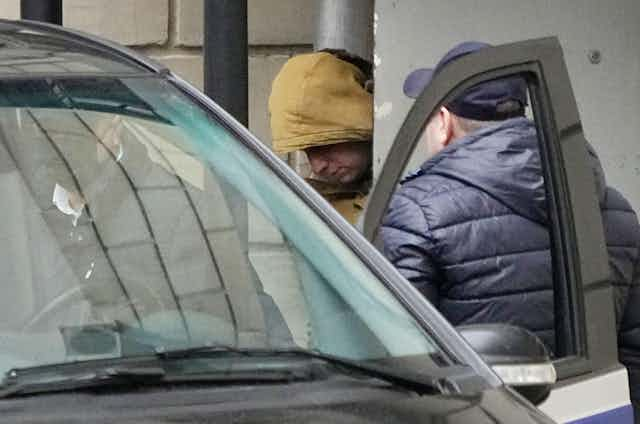For the first time since the cold war, Moscow has accused a US journalist of espionage. Evan Gershkovich, a reporter with the Wall Street Journal, was arrested in Yekaterinburg on March 29 by Russia’s Federal Security Service (FSB). The reporter, a Russia specialist, insists he was there to report on the Wagner Group, a mercenary organisation that fights for Russia in Ukraine. But the FSB has charged him with spying on “one of the enterprises of the Russian military-industrial complex”.
Not surprisingly, the Wall Street Journal vehemently rejects the allegations. On April 11 the US secretary of state, Anthony Blinken, announced that Gershkovich has been “wrongfully detained” and called for his immediate release, condemning Russia’s “ongoing war against truth”.
Sitting in Moscow’s Lefortovo Prison, Gershkovich will find scant comfort in the notion that he is merely the latest in a long history of journalists harassed, detained or expelled in wartime. The familiar assertion that truth is the first casualty of war tells only half the story. Journalists who seek to tell it are often victims too.
Truth to power
In the 19th century, war reporting was transformed by new technologies including photography and the electronic telegraph. Readers experienced the consequences in vivid coverage of the Crimean war (1853-1856), American civil war (1861-1865) and Franco-Prussian war (1870-1871).
War correspondents were glamorous figures until the first world war, when their freedom to report events as they observed them was curtailed by governments desperate to control information reaching the home front.
In the UK, the 1914 Defence of the Realm Act greatly increased the state’s powers of control. Winston Churchill, then in charge of the navy, expressed the government’s hostility to the idea that correspondents should report from the frontline. “The best place for correspondence about this war will be London,” he advised newspaper editors.
Philip Gibbs of the Daily Telegraph was warned that if he attempted to return to France without explicit consent he would be shot.
Suspicion has plagued journalists who attempt to report truth from war zones ever since. The Spanish civil war (1936-1939) offers chilling examples of persecution by both sides. After French journalist Renée Lafont was found by nationalist forces in Cordoba carrying papers issued by the legitimate republican government in September 1936, she was condemned to death as a spy and executed by firing squad – the first female French journalist to die doing her job.
The second world war brought ruthless suppression of independent reporting in Hitler’s Germany and Stalin’s Soviet Union, and intense censorship in the allied democracies. In the UK this was, from June 1940, enforceable by two new defence regulations.
Regulation 2C gave ministers power to “exclude any material calculated to foment opposition to the war”. Regulation 2D empowered the home secretary to close newspapers that systematically fomented opposition to the British war effort. Churchill, by this time prime minister, proved willing to deploy these powers against titles that simply criticised policy.
During the Falklands War in 1982, top correspondents including the BBC’s Brian Hanrahan, Independent Radio News correspondent Kim Sabido and Max Hastings of the Daily Telegraph were embedded with British troops. Their reports brought uplifting accounts of British military prowess to audiences in the UK, but their capacity to question policy and tactics was restricted by onerous censorship.
Challenging the myths of war
Alan Little, the multiple award-winning BBC conflict correspondent describes eyewitness reporting as among “the purest and most decent work” journalists can do. He credits such reporting with “the power to close down propaganda, to challenge myth making”.
In my view, Little is right. Eyewitness war reporting can provide a first draft of history. Sadly, this is among the reasons that armed forces regard journalists as, at best a nuisance to be carefully handled, and at worst a vivid threat.
Nato armed forces share with their counterparts in authoritarian states the desire to restrict access and censor reports. They need to maintain strict operational secrecy. Such caution is applied by even the most blameless victims of aggression. The Ukrainian government also makes strenuous efforts to control war reporters.
But 21st-century technology presents censors with daunting new challenges. Digital investigators such as the Bellingcat group use sophisticated open-source techniques to uncover misdeeds. Both sides in the battle for Ukraine are under scrutiny by such work, which exploits available data – anything from satellite images to electoral registers and telephone directories – to uncover hidden stories.

Russian military bloggers (“milbloggers”) using virtual private networks to get around Kremlin control of the internet offer additional insights. In some cases they have been highly critical of the way the Kremlin and Russia’s armed forces are conducting the war.
And brave reporters still attempt eyewitness reporting. Evan Gershkovich is among them. The son of Soviet émigrés, Gershkovich is a Russian speaker determined to expose wrongdoing and promote the best of his family’s ancestral home. Instead of arresting him, Vladimir Putin might have done well to read his work.
Early in the war, Gershkovich revealed why, contrary to official accounts, the Russian campaign was chaotic and mismanaged. He worked as part of a reporting team which explained that Putin is surrounded by a military bureaucracy that fears his displeasure. He has few, if any, independent sources of information on which he can rely. Gershkovich could have been one.
There is hope that Gershkovich could be being held ahead of a possible prisoner exchange. There have already been a number of these during the conflict involving Americans detained in Russia and vice versa.
Now the US State Department’s decision to designate Gershkovich as “wrongfully detained” means that work to secure his release is in the hands of the US Special Envoy for Hostage Affairs. It will be given high priority, and Gershkovich, his family and any reporters risking their lives to report the war will be hoping his case is resolved as quickly as possible.

